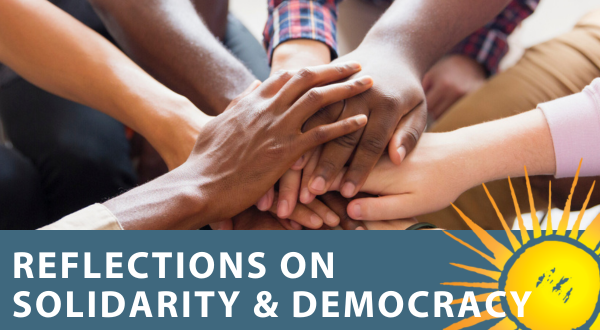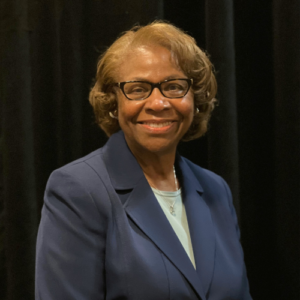
The Edge of Solidarity
Renewal Comes from Expanding Our View of the Human Family
Joan F. Neal
July 20, 2023
This past spring, the Vatican issued a document repudiating the “doctrine of discovery,” which was used to justify colonialism and atrocities against Indigenous people for centuries. While this movement by the church is welcome and long overdue, it is not without its flaws. Not only does the Vatican document minimize the church’s active and supportive role in colonialism and the oppression and abuse of Indigenous people, it also makes no mention of the transatlantic slave trade. Once again, the institutional church has failed to take responsibility for its role in enslaving human beings.
This is a helpful illustration of how even those who seek to be allies in the struggle for justice in our society will be confronted time and again by the limits they place on solidarity — by the people whose struggles we fail or choose not to see. Solidarity is like the edges of a canvas or picture frame. It can be extended wide to include the entire human family. Or it can be narrowed so that some individuals, or even entire communities, are left standing beyond the edges of our “family picture.”
Solidarity can also be like the aperture that adjusts how much light is let into a camera lens. When we set the aperture of solidarity wide, the light can be dazzling, causing so many people — overcome by their role in systems and structures of injustice and oppression — to shut down and retreat to a place of defensiveness and frailty. Every time a politician or media figure decries “wokeness” in our society, I shake my head, sadly aware that this is probably a person who sees the systemic problems and injustices in our midst, but also doesn’t want to do the work to correct these problems, perhaps afraid of what they might be asked to give up in the process.
It is essential that we persist in doing the real work of solidarity — that we let in the light and extend the frame to the whole picture. We know from Scripture and Catholic Social Teaching (such as articulated by Pope Francis in Laudato Si’) that all of us are connected. When we’re selective in our solidarity, we can make well-intentioned missteps. Recall, in the wake of the 2016 election, how reporters flocked to diners in rural Pennsylvania in an effort to understand and empathize with the “left behind” Trump voter. This attempt at solidarity with one group was admirable, of course, but failed to recognize the wave of destructive policies against Black and Brown communities and the very fabric of U.S. democracy that was unleashed by Trump’s victory.
Today, it’s clearer than ever that we face a political movement in this country whose capacity for solidarity is completely closed off to others and only includes themselves and people who look and think like them. Christian nationalism embraces the dismantling of democratic structures and weaponization of systems of government to punish those outside of their group and to further oppress people who question this raw use of power that benefits only a white, wealthy few.
This aggressive anti-democratic movement has been on full display as it moves through state legislatures and other government bodies. It is animated by an awareness that, ironically, feeds into the worst aspects of its own rhetoric: that white Christians represent a shrinking, dying demographic, and that their values are not shared by younger generations. Of course, full participation in society by a multitude of diverse communities is not the end of anyone’s way of life, unless that way of life is defined by racism. The fear of being replaced by one’s neighbor is the antithesis of solidarity.
Pope Francis has distinguished between populist political movements, which destroy democracy, and movements that are truly popular — that is, of the people — which can be a source of deep renewal in their societies. During this first half of 2023, NETWORK has embraced Pope Francis’ distinction and embarked on a movement for unflinching solidarity, declaring that communities in poverty cannot be held hostage to reckless and cruel budget cuts. That migrant people cannot be left out of our calculus of who matters as we build this country anew. That Black and Brown people, women and children are also made in the image and likeness of God, and their dignity must be respected. That solidarity is our only path out of the destructive environment of our society today.
We affirm time and again that universal solidarity cannot be separated from the long-term protection of our democracy and the transformation of our politics. In fact, it is the key to lasting freedom and equality, and to the renewal and the authenticity of our own popular movement. Leaving people neglected outside the limits of our frame is a recipe for disaster. But journeying together in true solidarity is indeed the way to the Beloved community, “one nation, indivisible, with liberty and justice for all.”
Joan F. Neal is NETWORK’s Deputy Executive Director and Chief Equity Officer.








